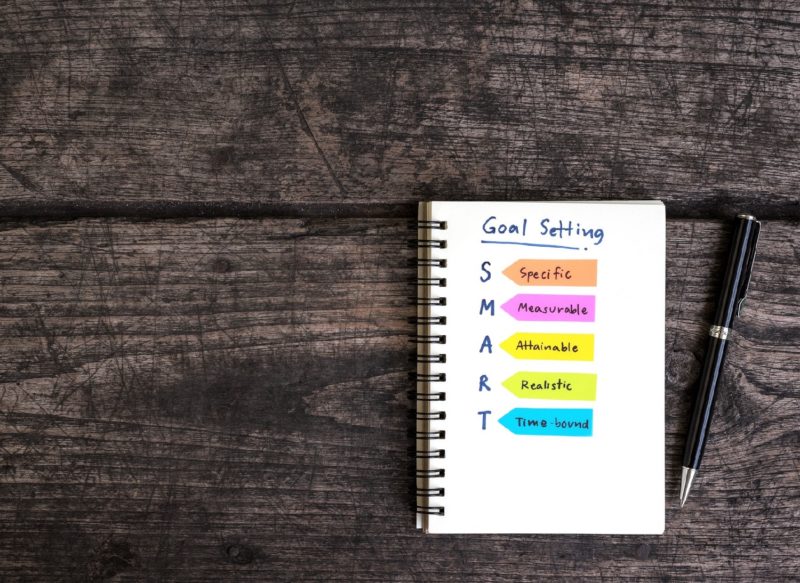Reach All Your Goals—Every Time!
Article posted in: Diet & Nutrition
You’ve heard it before—set a goal, then write it down. Don’t believe it? Consider this: A study conducted by Harvard Business School found that people who wrote down their goals were making 10 times as much money after 10 years than those who didn’t put pen to paper. And it will probably help your weight loss and fitness goals, too. Before you start scribbling, though, check out these tips to make every goal you set more likely to succeed.
Be SMART – SMART is an acronym that will help you set effective goals. If your goals meet all five criteria spelled out by the capital letters, the SMART system says you’re more likely to reach them.
- S is for specific. Instead of saying, “I want to lose weight,” go for “I want to look great in a little black dress.”
- M is for measurable: Maybe it’s a specific dress you’re after, or a specific size, which can be measured.
- A is attainable: If the dress you’re after is too short for you, it may not work at all. Make sure the goal isn’t so ambitious that it can never be reached.
- R is realistic, which is different from attainable: It’s not whether you think you can do something, but whether you will or want to attain this goal. Are you willing to do what it takes to reach the goal? If so, set a deadline:
- T is for time-bound. In our dress example, a SMART goal might be: “I want to lose 18 pounds to fit into the black dress I wore to my 10-year high school reunion in six months.”
Set Goals You Can Control Experts talk about “outcome” goals, which revolve around the potential end results of a group of actions, and “process” goals, which focus on the means that can result in those ends. Outcome goals, especially in weight loss, can be out of your control: If you goal is to lose 10 pounds in a certain period, you may fall short because your menstrual cycle causes you to retain water or other things you can’t fix. But a process goal is within your control, and leads you towards your desired outcome. That’s why psychologists prefer this style. A process goal to “stay on my diet plan for 9 out of 10 meals each week,” or “exercise 12 times each month” is entirely up to you—and it can help you reach the outcome you’re after.
Go Big Now that you’re SMART and are thinking process, come up with an ambitious, visionary goal. In a study from The Journal of Consumer Research, participants who set more ambitious goals had higher rates of satisfaction—no matter the outcome—than those who set more conservative goals. So start with an end state in mind, and get really specific about it: What does your goal physique entail, and what do you want to do with that body? What kind of clothes do you wear? What activities do you enjoy? Use this far-off goal as your ultimate endgame, and something from which to frame your smaller goals.
Go Small The smaller goals you set are mileposts on the journey to the larger goal. You may not see the incremental progress towards your ultimate goal, but you can put a notch in your belt because in your second week, you ate an extra serving of vegetables each day or walked for 5 minutes more than the week before. And small, achievable goals are important. According to a 2011 study from the Netherlands, arthritis patients who reached small, realistic physical activity goals saw a direct improvement benefit in their condition and quality of life. The study says these participants experienced higher levels of self-efficacy: That is, they came to believe they were capable of doing things and making changes.
Reaching smaller, shorter-term goals (and having more to strive for) can also keep you motivated—you’ll see obvious progress every day.
Try this Strategy: 5×5
To create a short- and long-term plan, try this five-goal system: Start with a SMART goal for 5 years from now. Then set a goal for 5 months from now that’s on the way to the five-year goal. Then set one for 5 weeks from now. Then 5 days from now. And finally, a goal for 5 hours from the moment you start setting goals. The healthier living example listed above would look like this:
• In 5 years, I will be a person who exercises 4 times per week, eats vegetables with every meal, and wears the same size jeans I did when I was 25.
• In 5 months, I will fit into the black dress I wore to my 10-year high school reunion
• In 5 weeks, I will have exercised 13 or more times to progress towards my goal.
• In 5 days, I will have completed a food log of my eating for 3 out of 5 days.
• In 5 hours, I will have swapped a full-calorie soda for a large glass of water.
Every time you reach a goal, set new SMART ones using this strategy. And write them down!






